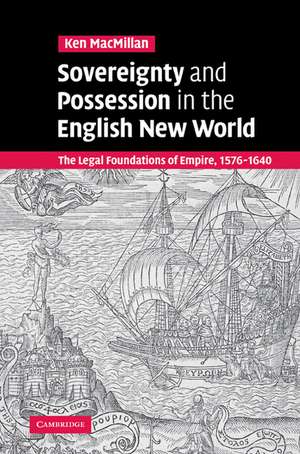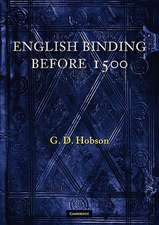Sovereignty and Possession in the English New World: The Legal Foundations of Empire, 1576–1640
Autor Ken MacMillanen Limba Engleză Paperback – 29 apr 2009
| Toate formatele și edițiile | Preț | Express |
|---|---|---|
| Paperback (1) | 359.67 lei 43-57 zile | |
| Cambridge University Press – 29 apr 2009 | 359.67 lei 43-57 zile | |
| Hardback (1) | 682.09 lei 43-57 zile | |
| Cambridge University Press – 22 noi 2006 | 682.09 lei 43-57 zile |
Preț: 359.67 lei
Nou
Puncte Express: 540
Preț estimativ în valută:
68.82€ • 72.04$ • 57.28£
68.82€ • 72.04$ • 57.28£
Carte tipărită la comandă
Livrare economică 31 martie-14 aprilie
Preluare comenzi: 021 569.72.76
Specificații
ISBN-13: 9780521109796
ISBN-10: 0521109795
Pagini: 252
Ilustrații: 11 b/w illus.
Dimensiuni: 152 x 229 x 15 mm
Greutate: 0.37 kg
Editura: Cambridge University Press
Colecția Cambridge University Press
Locul publicării:Cambridge, United Kingdom
ISBN-10: 0521109795
Pagini: 252
Ilustrații: 11 b/w illus.
Dimensiuni: 152 x 229 x 15 mm
Greutate: 0.37 kg
Editura: Cambridge University Press
Colecția Cambridge University Press
Locul publicării:Cambridge, United Kingdom
Cuprins
Introduction; 1. Sovereignty, empire, and law in a New World context; 2. Defining the Elizabethan empire in America; 3. Letters patent and the acquest of dominion; 4. Defending sovereignty and possession in the New World; 5. Mapping the English empire in North America; 6. Negotiating the early-Stuart empire in America; Bibliography; Index.
Recenzii
"MacMillan's exploration of the earliest origins of the British transaltlantic imperial constitution is a valuable study that enables us to see the full range of jurisprudence that ultimately became the foundation of British-American constitutionalism in the eighteenth century."
-Erin Rahne Kidwell, Georgetown University Law School
"[...]this exhaustively researched and gracefully written monograph is important historiographically and substantively, and deserves a wide and critical readership."
-Herbert A. Johnson, The Journal of American History
"Ken MacMillan[...]offers several interesting arguments about the ways sovereignty was asserted by Elizabeth I, James I, Charles I and their subordinates."
-James Muir, H-Law
"The result is a tightly focused and clearly argued exploration of the early English legal justifications for why England, rather than Spain, France, or anyone else, had the right to claim the parts of North America that would become English colonies.
-Stuart Banner, Law and History Review
"MacMillan's considerable achievement[...]is to explain the expressive logic[...]of English soverign possession in the New World."
-Christopher Tomlins, Institute of Historical Research
"MacMillan's book is well-written and convincing[...]impressive debut book."
Daniel Woolf, The International History Review
"There is no question that MacMillan has written a book of considerable importance, one from which British and American historians alike will benefit."
-Eliga H. Gould, University of New Hampshire, American Historical Review
"Ken MacMillan has effectively pulled aside Strabo's cloack, and given us a vastly rich and promising route into the British Atlantic World."
-Charles W.A. Prior, University of Hull, Canadian Journal of History
"...excellent book....ambitious comparative analysis....clear and compelling manner in which MacMillan links the Crown's methods of asserting possession and sovereignty in America to the broader issue of the legal status of the colonies vis-'a-vis England....For acquainting us with this all-important imperial actor and the Roman law that it wielded with such confidence, we are indebted to MacMillan and his fine book."
--Alexander Haskell, University of California, Riverside, William and Mary Quarterly
-Erin Rahne Kidwell, Georgetown University Law School
"[...]this exhaustively researched and gracefully written monograph is important historiographically and substantively, and deserves a wide and critical readership."
-Herbert A. Johnson, The Journal of American History
"Ken MacMillan[...]offers several interesting arguments about the ways sovereignty was asserted by Elizabeth I, James I, Charles I and their subordinates."
-James Muir, H-Law
"The result is a tightly focused and clearly argued exploration of the early English legal justifications for why England, rather than Spain, France, or anyone else, had the right to claim the parts of North America that would become English colonies.
-Stuart Banner, Law and History Review
"MacMillan's considerable achievement[...]is to explain the expressive logic[...]of English soverign possession in the New World."
-Christopher Tomlins, Institute of Historical Research
"MacMillan's book is well-written and convincing[...]impressive debut book."
Daniel Woolf, The International History Review
"There is no question that MacMillan has written a book of considerable importance, one from which British and American historians alike will benefit."
-Eliga H. Gould, University of New Hampshire, American Historical Review
"Ken MacMillan has effectively pulled aside Strabo's cloack, and given us a vastly rich and promising route into the British Atlantic World."
-Charles W.A. Prior, University of Hull, Canadian Journal of History
"...excellent book....ambitious comparative analysis....clear and compelling manner in which MacMillan links the Crown's methods of asserting possession and sovereignty in America to the broader issue of the legal status of the colonies vis-'a-vis England....For acquainting us with this all-important imperial actor and the Roman law that it wielded with such confidence, we are indebted to MacMillan and his fine book."
--Alexander Haskell, University of California, Riverside, William and Mary Quarterly
Notă biografică
Descriere
How did English notions of sovereignty, empire and law impact their methods of settlement in the Americas?



















